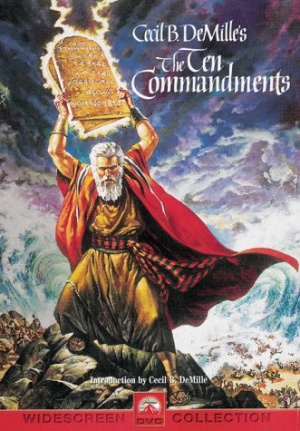Difference between revisions of "The Ten Commandments (1956 film)"
(Category:Christian movies) |
(link to Cecil B. DeMill) |
||
| (One intermediate revision by one other user not shown) | |||
| Line 1: | Line 1: | ||
| − | |||
{{quote | text="It would take more than a man to lead the slaves from bondage. It would take a god." Words of [[Moses]] in the film}} | {{quote | text="It would take more than a man to lead the slaves from bondage. It would take a god." Words of [[Moses]] in the film}} | ||
| + | {{Infobox_Contents | | ||
| + | topic_name = The 10 Commandments (1956 film) | ||
| + | [[Image:Ten_Commandments_Cover.jpg|thumb|center|Poster for the movie]] | | ||
| + | subtopics = [[Exodus]], [[Exodus 20]], [[Ten Commandments]] | ||
| + | * [[The Ten Commandments (1923 film)]] | | ||
| + | opinion_pieces = {{short_opinions}} | | ||
| + | }} | ||
| − | + | The Ten Commandments is a 1956 epic film directed by [[Cecil B. DeMill]], which tells in a Hollywood style the [[Bible]] story of [[Moses]] (played by [[Charlton Heston]]) as he comes to know [[God]] and to get Pharaoh Ramses ([[Yul Brynner]]) to let the Israelites leave [[Egypt]]. | |
| − | |||
| − | |||
| − | |||
| − | |||
| − | |||
| − | |||
| − | |||
| − | |||
| − | |||
| − | |||
| − | |||
| − | |||
| − | |||
It is the 5th highest grossing movie of all time, adjusted for inflation, with collections of $838,400,000. In non-adjusted dollars, it held the record as the highest-grossing film with a religious storyline until the 2004 film [[The Passion of the Christ]]. | It is the 5th highest grossing movie of all time, adjusted for inflation, with collections of $838,400,000. In non-adjusted dollars, it held the record as the highest-grossing film with a religious storyline until the 2004 film [[The Passion of the Christ]]. | ||
| Line 48: | Line 41: | ||
* [http://us.imdb.com/title/tt0049833/ The Ten Commandments at us.imdb.com] | * [http://us.imdb.com/title/tt0049833/ The Ten Commandments at us.imdb.com] | ||
* [http://en.wikipedia.org/wiki/The_Ten_Commandments_(1956_film) Wikipedia - The Ten Commandments (1956 film)] | * [http://en.wikipedia.org/wiki/The_Ten_Commandments_(1956_film) Wikipedia - The Ten Commandments (1956 film)] | ||
| + | |||
| + | {{returnto}} [[Christianity]] -> [[Christian movies]] | ||
[[Category:Christian movies]] | [[Category:Christian movies]] | ||
Latest revision as of 13:16, 27 November 2009
|
"It would take more than a man to lead the slaves from bondage. It would take a god." Words of Moses in the film
|
| The 10 Commandments (1956 film) | |
| RELATED TOPICS | |
| SERMONS, ESSAYS AND OPINIONS |
|
| CONTENTS | |
The Ten Commandments is a 1956 epic film directed by Cecil B. DeMill, which tells in a Hollywood style the Bible story of Moses (played by Charlton Heston) as he comes to know God and to get Pharaoh Ramses (Yul Brynner) to let the Israelites leave Egypt.
It is the 5th highest grossing movie of all time, adjusted for inflation, with collections of $838,400,000. In non-adjusted dollars, it held the record as the highest-grossing film with a religious storyline until the 2004 film The Passion of the Christ.
Critics have argued that considerable liberties were taken with the Biblical story, affecting the film's claim to authenticity, but this has had little effect on its popularity. For decades, a showing of The Ten Commandments was a popular fund-raiser among revivalist Christian churches, while the film was equally treasured among film buffs for DeMille's "cast of thousands" approach and the heroic but antiquated silent-screen-type acting.
In 1999, satisfying both audiences, the film was deemed "culturally significant" by the United States Library of Congress and selected for preservation in the National Film Registry.
The movie's cast evokes its period: Charlton Heston, Yul Brynner, Anne Baxter, Edward G. Robinson, Yvonne De Carlo, Debra Paget, John Derek, Sir Cedric Hardwicke, Nina Foch, Martha Scott, Dame Judith Anderson, Vincent Price and John Carradine.
The parting of the Red Sea won the film its Oscar for Special Effects, while the worship of the Golden Calf owed something to opera staging of Saint-Saëns' Samson et Dalila. The giving of the Ten Commandments on Mount Sinai is also considered a dramatic highlight.
Aside from the Academy Award for Best Effects, Special Effects and was nominated for Best Art Direction-Set Decoration, Color, Best Cinematography, Color, Best Costume Design, Color (Edith Head, Ralph Jester, John Jensen, Dorothy Jeakins and Arnold Friberg), Best Film Editing, Best Picture and Best Sound, Recording.
The film was adapted by Aeneas MacKenzie, Jesse Lasky Jr., Jack Gariss and Fredric M. Frank from the J.H. Ingraham novel Pillar of Fire, the A.E. Southon novel On Eagle's Wings and the Dorothy Clarke Wilson novel Prince of Egypt.
DeMille had previously made the film in a silent 1923 version.
Quotes
Words of Moses in the film
- It would take more than a man to lead the slaves from bondage. It would take a god.
- Blood makes poor mortar.
Words of Ramese II in the film
- His God... is God!
Words of Joshua in the film
- God made men. Men made slaves.
Links
Return to Christianity -> Christian movies
